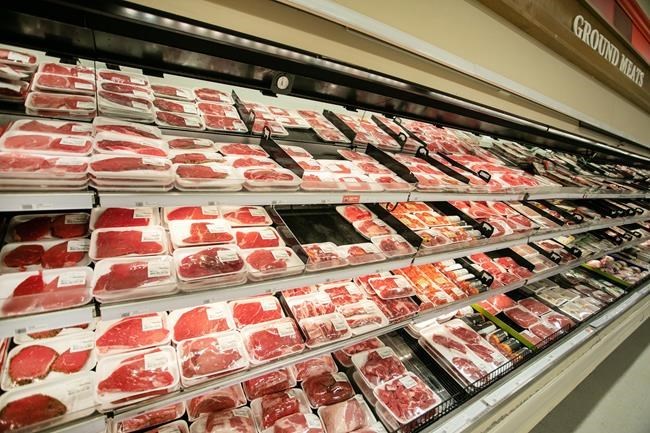
Various cuts of beef are seen in the meat section at a grocery store in Halifax, Friday, Jan. 28, 2022. THE CANADIAN PRESS/Kelly Clark
Republished July 18, 2023 - 10:48 AM
Original Publication Date July 18, 2023 - 1:06 AM
OTTAWA - Canada's inflation rate has fallen back to the country's target range for the first time in more than two years, but economists say the fight against high inflation is far from over.
Annual inflation tumbled to 2.8 per cent in June, Statistics Canada reported Tuesday. The deceleration was broad-based, though lower gasoline prices compared with last year led the slowdown.
But Canadians continue to pay substantially higher prices for groceries, as prices rose 9.1 per cent year-over-year, slightly faster than in May.
The annual inflation rate was 3.4 per cent in May. The last time it fell below three per cent was March 2021.
Finance Minister Chrystia Freeland called the return of inflation to the target range a "milestone moment."
"That is a significant moment. It should provide a lot of relief to Canadians," Freeland told reporters in a virtual news conference on Tuesday.
However, it's not all good news on the inflation front. Core measures of inflation — which strip out volatility — have not eased as much.
The Bank of Canada pays close attention to its preferred core measures of inflation to gauge underlying price pressures. These measures are hovering between 3.5 and 4.0 per cent.
"Some good news, some bad news, I guess, depending on which way you want to read it," said Benjamin Reitzes, BMO's managing director for Canadian rates and macro strategist, in an interview.
"But enough encouraging signs, I think to make the (central) bank a little bit more comfortable on the margin, at least with the direction that inflation is headed."
Leslie Preston, TD managing director and senior economist, echoed Reitzes' comments in a client note.
"The June inflation data likely provides some reassurance that things are moving in the right direction, but not fast enough for the Bank of Canada lets its guard down," wrote Preston.
Indeed, the central bank has indicated that it's still concerned about the trajectory inflation is taking.
Earlier this month, the Bank of Canada raised interest rates again in part because its now projecting inflation to stay high for longer.
The central bank said it expects inflation to hover around three per cent over the next year, before steadily declining to two per cent by mid-2025.
Tuesday’s report shows inflation falling within the central bank’s one to three per cent range, though the Bank of Canada has been adamant that it wants to see the rate at two per cent.
The central bank's aggressive rates hikes are intended to choke off demand in the economy by making it more expensive for consumers and businesses to borrow.
That process is supposed to bring inflation down, though in the meantime, it’s driving up the interest Canadians pay on their mortgages.
The federal agency says the annual inflation rate would have been two per cent when mortgage costs are excluded.
Mortgage interest costs were up more than 30 per cent from June 2022, when the Bank of Canada's key interest rate was 1.5 per cent compared with 4.75 per cent for most of June 2023. With July's quarter-percentage-point rate hike, the central bank rate is now five per cent.
The Bank of Canada's next rate decision is slated for Sept. 6. The central bank has suggested that it will make its rate decisions based on incoming economic data and has tried to discourage any hopes of rates getting lower.
Reitzes says he expects next month's inflation report to bring good news for the central bank, and says BMO is not anticipating another rate hike.
Tuesday’s report shows prices for a range of goods and services are moderating, serving as good news for consumers who have been facing steep price increases since the pandemic.
Transportation costs, for example, decreased year-over-year as gasoline prices have fallen and the pace of price growth for vehicles decreases.
Consumers also paid 14.7 per cent less for cellular services than they did a year ago, which the federal agency says is due to lower prices for data plans and sales promotions.
This report by The Canadian Press was first published July 18, 2023.
News from © The Canadian Press, 2023